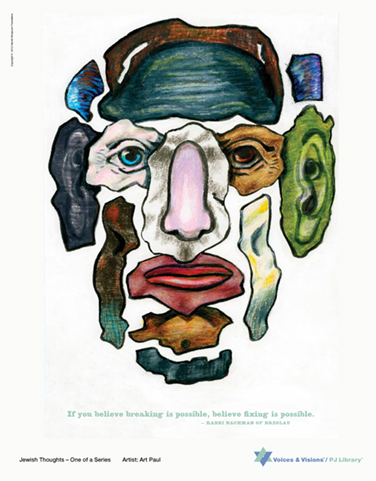
“If you believe breaking is possible, believe fixing is possible.”
-Rabbi Nachman of Breslau
Voices & Visions Dvar Torah
Congregation B'nai Torah - Forest Park Minyan (Springfield MA)
Shabbat Ki Tavo, August 24, 2013
By Connie Ryder
Three connections were made when thinking and reading about the quotation:
1. Connection to the “broken” face
2. Connection to the parsha
3. Connection to Rosh Hashanah
When Bob drafted me to speak on this poster, I heard him say “If you believe in breaking, then you believe in fixing.” It seemed to align with the parsha so directly that the task seemed easy. Bob was right when he said this poster was perfect for me to study. The artist’s drawing of a “broken” face, which I live with, relates directly to the first half of the quote. What’s important is that what’s behind the face, the brain, is intact and functioning. Thinking and feeling take place in the brain.
One of my favorite quotes is, “Attitude is the father of the action.” Attitude is comprised of thought and emotion. It is manifested not only in action, but in how we carry out those actions and carry ourselves.
Last week Rabbi Wolff spoke about making the time to do something. He noted that it’s not enough to think it, that sometimes it’s challenging to meet our goals. If it’s really important to us, however, we find a way to get the job done. That essence of importance is the emotion piece influencing the action.
In this week’s parsha, Moshe laid out the blessings Jews will receive if the Torah is followed and the curses if it isn’t. These if/then statements are often used for new learning as they use the associative thought process, similar to using mnemonic devices. Moshe was speaking to us as individuals. The statements are admonitions, or “must-dos.” We previously heard them voiced by Hashem, where he was speaking to Jews in the plural.
Rabbi Wolff spoke to us this week saying that we share in one another’s joys and sorrows as an individual and as a community, essentially, one for all and all for one. That being the case, our decision to follow or not follow the lifestyle outlined in the Torah as individuals affects the entire community.
It was about now that I realized, with sickening dread, the actual wording of the quotation didn’t include the then word in the second half. But then saw it as an optimistic, hopeful counterpoint to the first half of the quotation.
Rosh Hashanah is coming. It’s a time of self-reflection where our “breaks” are discovered and we find them in abundance. Rabbi Nachman is not admonishing us to fix things, it’s not a must do. He’s gently reminding us to believe fixing is possible. Believing is key. Believe is an action word. You have to choose to believe. He’s asking us to make the choice of believing, giving us license to make that choice so we can begin the process of repair. While believing is an action word, it’s rooted in emotion, thus connecting the attitude to the healing of what’s broken inside of us.
Hashem spoke to the collective body which would be distilled to individuals. Moshe spoke to us individually which is expressed communally. It’s a dynamic process between the singular and plural and action and emotion. We need the attitude of believing to accompany the action of reparation as we knit our individual breaks and heal ourselves and the community.
